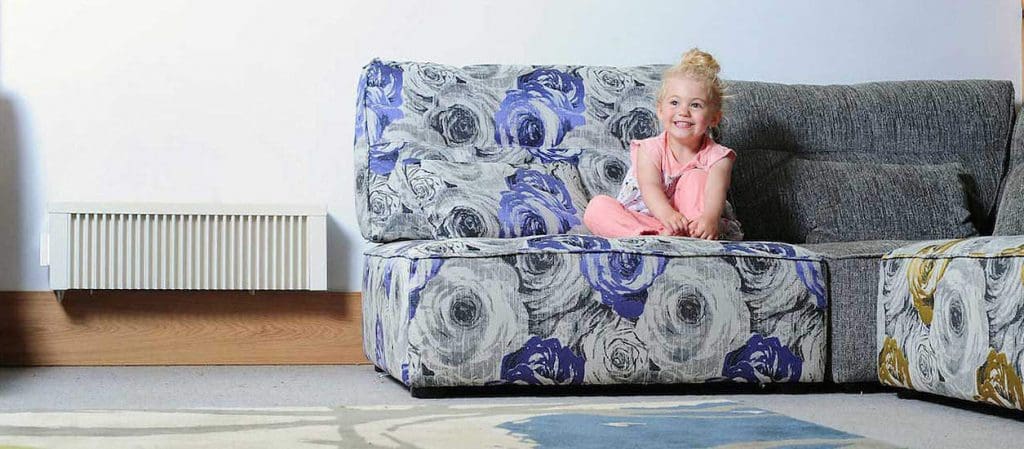Gas vs electric heating – How could switching to electric benefit me?
There are benefits and drawbacks to all types of heating systems. When it comes to gas vs electric heating, considering the type of energy your home system is run from and the specific product used to deliver the heat, is important.
The efficiency of a gas boiler system depends on its age & design, likewise the efficiency of an electric heating system depends on if it loses heat & how fast it heats your home.
On this page we only compare our independently tested electric heating system and how it compares to gas central heating. Not all electric radiators (especially flat panel systems or those with less advanced control systems) will compare in the same way.

Gas vs electric heating - Appearance
Gas boilers can be clunky and take up considerable space.
If you don’t already have a gas central heating system they can be messy and time consuming to install.
In comparison, our electric radiators don’t need a large central control system, so no precious space is lost. There is no mess, and they can be installed within just one day.
Our electric radiators are modern & slimline and are available in over 400 RAL colours & a range of sizes (including custom sizes) to fit with your home and style.

Gas vs electric heating - How expensive are they to run?
It’s often believed that a gas central heating system is the cheapest to run because the price of gas is cheaper per kilowatt hour, sometimes as little as 4p per kWh of heat, compared to electric, which can be around 11/13p per kWh depending on your provider. But the lack of control you have with a gas system vs an electric system is an important consideration.
How much you’re spending with either system also depends on how much energy you’re using. It’s easier to use more energy than you need when the system you use 1) is prone to heat wastage 2) is harder to control, like gas systems tend to be.
Our electric radiators can be controlled individually & precisely to the degree, by the minute, so you’re never, ever using energy you don’t need. You can control them wherever you are & when they heat your room up to your desired set temperature, they stop drawing power, retaining heat for up to one hour afterwards.
Gas vs electric heating - Heat wastage from gas systems
Heat loss from gas systems accelerates according to the location or even the length of the pipework, meaning that the last radiator may well have less than half the efficiency of the first. On average, you get about 75% of heat that you produce from gas central heating, therefore, the lower kWh rate is less useful as may first be perceived. Given that you lose 25%, your system will continuously need to produce enough heat to ensure that that lost heat is being pushed through the system.
Most gas boilers require a small amount electricity to turn on & keep running during the course of the day. They can draw electricity even when your heating is not turned on.
Although you can set each gas radiator to the temperature you wish, this type of control system is often not precise.
The design of wet heating systems radiators mean they often don’t project heat around the room quickly or effectively, leaving cold spots (especially on the floor) or taking a longer time to heat up your room.
Gas vs electric - Heat wastage from electric heating systems
Our electric radiators are 100% efficient & A++ EU energy rated. Any electricity used is turned directly into heat for your home, with no heat loss and no wasted energy.
radTherm electric radiators only draw power to heat your room to the temperature you choose, turning off when the correct temperature is reached and only drawing power when the room falls below your set temperature.
radTherm radiators don’t have high input values & we have a wide range of size & kW options to suit your individual needs.
Not all electric heating or electrical products are 100% efficient. This is a common misunderstanding & doesn’t take into consideration heat loss, which can considerably impact performance.
There are many types of electric radiators, some can also look similar whilst having key differences, so it’s always important to make comparisons on a case by case basis.
Gas vs electric - Impact of design on efficiency & effectiveness
The deep fluted design of our radTherm electric heaters allows for gentle, natural convection where colder air is sucked up through the radiator and pushed out and up to circulate around the room. This movement of air over the surface of the ceramic core centre gives a more even heat distribution, throwing radiant heat in all directions.
The Magmatic core also stores heat, meaning they only need to use electricity for a fraction of the time they’re being used. Our electric radiators can even stay warm for up to 1 hour after they turn off.
The double front and back flutes of the radiator hide a far larger surface area (up to 5x larger) than you’ll find on many gas radiators. A larger surface area also helps to heat your room more quickly.
Although there are all kinds of fun style options when it comes to gas radiators, designs that aren’t fluted don’t make the most of natural convection. This can cause cold spots and mean they can take much longer to heat a room.
Once gas radiators are turned off, they lose heat extremely quickly.
Gas Requires Annual Maintenance
Our German Electric heating = No Maintenance
radTherm German radiators have modern, robust technology and require no maintenance or servicing. All our radiators come with a genuine manufacturer guarantee from radTherm for 25 years, which means our customers have total peace of mind that in the event of any issue with the product, they are covered.


